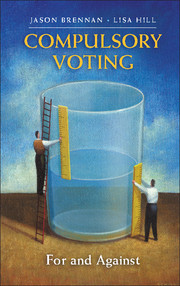Book contents
- Frontmatter
- Contents
- Acknowledgments
- Part I Medicine Worse Than the Disease?
- Part II Compulsory Voting Defended
- 5 Compulsory Voting: Background, Effects, Feasibility, and Basic Premises
- 6 Turnout, Abstention, and Democratic Legitimacy
- 7 Is Compulsory Voting an Unjustified Burden on Personal Autonomy?
- 8 Is Requiring People to Vote Contrary to Democratic Values?
- 9 Conclusion
- Bibliography
- Index
- References
8 - Is Requiring People to Vote Contrary to Democratic Values?
Published online by Cambridge University Press: 05 June 2014
- Frontmatter
- Contents
- Acknowledgments
- Part I Medicine Worse Than the Disease?
- Part II Compulsory Voting Defended
- 5 Compulsory Voting: Background, Effects, Feasibility, and Basic Premises
- 6 Turnout, Abstention, and Democratic Legitimacy
- 7 Is Compulsory Voting an Unjustified Burden on Personal Autonomy?
- 8 Is Requiring People to Vote Contrary to Democratic Values?
- 9 Conclusion
- Bibliography
- Index
- References
Summary
The question of whether compulsory voting is inimical to democratic ideals has been partly dealt with in earlier chapters, where I argued that while it infringed on personal liberty, it enhances the democratic values of legitimacy, representativeness, political equality, inclusiveness, minimization of elite power, and final control of the agenda by the demos. In this chapter, I argue that compulsory voting also serves the value of substantive equality of political opportunity (as opposed to either political equality or formal equality of opportunity). I also explore a number of other issues relating to the effect on democratic values of compulsory voting. The first concerns the argument that compulsory voting is overinclusive and therefore introduces distortions into the electoral process that undermine good governance. On this view, not only is compulsory voting a bad idea, but there also is a duty for some people – such as those who vote “badly,” are indifferent to the outcome of an election, or are “unaffected” by the outcome of an election – not to vote in order to protect democratic values. I then argue that although compulsory voting seems to violate the democratic values of voluntarism and autonomy, because of its tendency to empower and protect people politically, it ultimately serves these values. Sometimes we need to reduce a value in order to promote it: specifically, in order to promote overall the values of voluntarism and autonomy, we should compel people to vote. Finally, I argue that compulsory voting is something that we would retrospectively impose on ourselves once we see its good effects, including its ability to solve the voting coordination problem.
- Type
- Chapter
- Information
- Compulsory VotingFor and Against, pp. 174 - 195Publisher: Cambridge University PressPrint publication year: 2014



